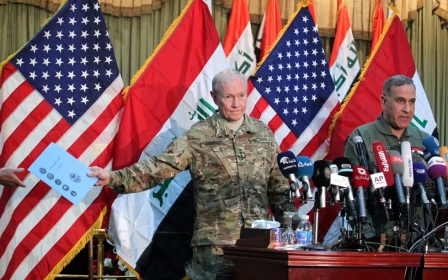Iraqi forces will liberate Tikrit within 72 hours: spokesman

Iraq forces besieging dozens of militants from the Islamic State group in Tikrit will have liberated the city within three days, a spokesman said on Saturday.
Karim al-Nuri, a top leader from the Badr militia and the spokesman of the volunteer Popular Mobilisation units, said it would take no more than “72 hours” to flush out IS fighters.
The Popular Mobilisation units account for the bulk of the manpower involved in the two-week-old operation to wrest back Tikrit, alongside army, police, militia and tribal forces.
The last IS militants holed up in the city centre are “surrounded from all sides,” Nuri said.
Speaking to AFP from the outskirts of Tikrit, near the village of Awja, he said “their number is now 60 to 70.”
Nuri added that the liberation of Tikrit would only be announced once a path had been cleared through the thousands of bombs the IS militants have planted to defend the city.
On Friday, an anonymous police colonel told AFP that half of Tikrit was now back under government control.
“We are surrounding the gunmen in the city centre,” he said. “We’re advancing slowly due to the great number of IEDs (improvised explosive devices).”
“We estimate there are 10,000 IEDs in the city,” he added.
The military operation into Tikrit, which was former Iraqi president Saddam Hussein’s home city, is being carried out by a combination of allied Iraqi forces, Shiite militias and volunteers from the Popular Mobilisation units. They are estimated to number 20,000 men, massively outnumbering the IS militants.
The Iraqi forces’ advance into Tikrit has been cautious, as Islamic State militants have relied extensively on the use of booby traps, snipers, roadside bombs and suicide car bomb attacks.
But the US has warned that holding the city, would likely prove harder than liberating it. Pentagon officials have also stressed that while the IS threat was marginally weaker, underlying causes behind the rise of IS had not been rooted out.
In comments made to the United States Central Command General Lloyd J. Austin III, the head of United States Central Command, said that while airstrikes had killed more than 8,500 militants, and successfully curtailed the group’s primary source of oil revenue the militants have managed to expand their reach internationally and have a string of dangerous new affiliates in Afghanistan, Algeria, Egypt and Libya. Boko Haram also pledged its allegiance last Saturday.
Stay informed with MEE's newsletters
Sign up to get the latest alerts, insights and analysis, starting with Turkey Unpacked
Middle East Eye delivers independent and unrivalled coverage and analysis of the Middle East, North Africa and beyond. To learn more about republishing this content and the associated fees, please fill out this form. More about MEE can be found here.




